|
|
|
Sort Order |
|
|
|
Items / Page
|
|
|
|
|
|
|
| Srl | Item |
| 1 |
ID:
124878
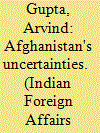

|
|
|
|
|
| Publication |
2013.
|
| Summary/Abstract |
What happens in Afghanistan post 2014 is uncertain. The situation being highly dynamic, it is difficult to make accurate forecasts. Most forecasts are gloomy, and predict political instability, a worsening security situation, a weak economy and violence. However, this pessimistic scenario need not materialise if post 2014 security mechanisms, economic assistance, and a stable political system are put in place. The outcome of the presidential elections on 5th April 2014, the nature of security uncertainties after 2014, and the success or failure of Karzai's efforts at reconciliation with Taliban would influence the situation post 2014.
|
|
|
|
|
|
|
|
|
|
|
|
|
|
|
|
| 2 |
ID:
119092
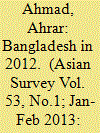

|
|
|
|
|
| Publication |
2013.
|
| Summary/Abstract |
The year 2012 began well for Bangladesh. Economic performance was impressive, and there were some notable political developments, such as the starting of the War Crimes Trial. However, corruption remained a pressing issue, the rule of law and human rights in the country became increasingly tenuous, and the political environment continued to be turbulent and uncertain. Moreover, issues regarding the country's relationship with both India and the U.S. were poorly resolved.
|
|
|
|
|
|
|
|
|
|
|
|
|
|
|
|
| 3 |
ID:
129509
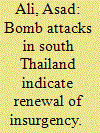

|
|
|
| 4 |
ID:
125599
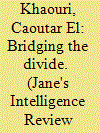

|
|
|
|
|
| Publication |
2013.
|
| Summary/Abstract |
The Islamist secular divide in Tusia has deepended in the midst of the deteriorating security situation, affecting democracy. Caoutar El Khaouri examines the likely outcome of the political crisis and the threat coming from Islamist -derived terrorisms
|
|
|
|
|
|
|
|
|
|
|
|
|
|
|
|
| 5 |
ID:
133666
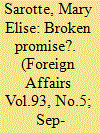

|
|
|
|
|
| Publication |
2014.
|
| Summary/Abstract |
Moscow has long argued that in expanding NATO eastward, Washington broke the promise it made to Soviet leaders shortly after the Berlin wall fell. But new evidence shows that the United States never actually made such a pledge.
|
|
|
|
|
|
|
|
|
|
|
|
|
|
|
|
| 6 |
ID:
177870
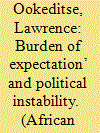

|
|
|
|
|
| Summary/Abstract |
This article argues the fallout between Botswana’s President Mokgweetsi Masisi and his predecessor Lieutenant General Seretse Khama Ian Khama is demonstration of the need for the country to reform its political system to accommodate direct election of the president. This would lessen seeds for political instability in the future. The central argument in the paper is that the system of ‘automatic succession’, wherein whoever is vice president automatically assumes the presidency when a sitting president’s tenure comes to an end, breeds a sense of entitlement and expectation between the alternators of power. The main conclusion of the paper is that the entitlement that comes with ‘automatic succession’ to the presidency is some form of debt of gratitude from the incumbent to their predecessor. This burden of expectation threatens to diminish the autonomy of an incumbent president and could birth political instability. The paper uses the Khama-Masisi transfer of power as its case in point.
|
|
|
|
|
|
|
|
|
|
|
|
|
|
|
|
| 7 |
ID:
133891
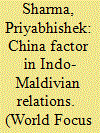

|
|
|
|
|
| Publication |
2014.
|
| Summary/Abstract |
Present paper makes an assessment of Indo-Maldives relationship with special emphasis on China factor in last two years. It is argued that since the controversial ouster of Mohamed Nasheed in Febuary 2012 Maldives' relationship with India has deteriorated in comparison to the previous three decades of constructive engagement. While political instability in Maldives has been a result of the clash of historical and social forces with the new democratic experiment launched in 2008, its fallout for India has come in the form of making latter's negative invocation in domestic political discourse by the rival elites.
|
|
|
|
|
|
|
|
|
|
|
|
|
|
|
|
| 8 |
ID:
133893
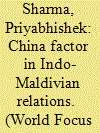

|
|
|
|
|
| Publication |
2014.
|
| Summary/Abstract |
Present paper makes an assessment of Indo-Maldives relationship with special emphasis on China factor in last two years. It is argued that since the controversial ouster of Mohamed Nasheed in Febuary 2012 Maldives' relationship with India has deteriorated in comparison to the previous three decades of constructive engagement. While political instability in Maldives has been a result of the clash of historical and social forces with the new democratic experiment launched in 2008, its fallout for India has come in the form of making latter's negative invocation in domestic political discourse by the rival elites.
|
|
|
|
|
|
|
|
|
|
|
|
|
|
|
|
| 9 |
ID:
181905
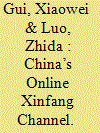

|
|
|
|
|
| Summary/Abstract |
Xinfang, as a major participation channel in China, sets social stability as its most important objective. The way it seeks to balance the participation-institutionalisation dynamic is thus key to understanding its function. Drawing on detailed interviews and archival sources, this study clarifies the practice and rationale of the new and important online xinfang channel which has not, to date, been amply examined. By integrating offline communication methods with the new online format, it achieves a subtler form of participation through field diversion, standardised settlement, and balanced evaluation, and thus partly corrects the offline xinfang channel’s heavy reliance on non-institutionalised tactics to maintain stability. However, as long as xinfang still operates at the intersection of law and politics, the question of how to balance citizens’ desire for participation and an appropriate level of institutionalisation remains a noteworthy issue, since stability is only achieved when these two elements are in equilibrium.
|
|
|
|
|
|
|
|
|
|
|
|
|
|
|
|
| 10 |
ID:
117898
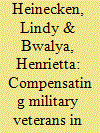

|
|
|
|
|
| Publication |
2013.
|
| Summary/Abstract |
This article outlines the widespread needs of South African military veterans and the possible consequences if the promises made in the recent Military Veterans Act are not met. The first part of the article defines who generally qualifies as a military veteran, how they are typically compensated in various countries with specific reference to neighbouring southern African countries, and what the consequences are when veterans become disenchanted with the state. The second part focuses on South Africa and the recent debates on military veterans and their entitlements. With reference to the findings of a qualitative study conducted among military veterans, parliamentary debates and media reports, an assessment is made of the demands and affordability of promised benefits and the consequences should the state not deliver. The conclusion is reached that heightened expectations are presently frustrated by slow roll-outs, and this is likely to increase the possibility of protest action. This has now the potential to create further tension within the ruling party and civil society, as the pressure on public finances mounts and demands become unsustainable. The effect this may have on political stability will depend on how the government manages this issue.
|
|
|
|
|
|
|
|
|
|
|
|
|
|
|
|
| 11 |
ID:
188775
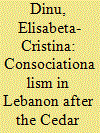

|
|
|
|
|
| Summary/Abstract |
The literature on consociationalism posits external threats increase elite cooperation and political stability in consociational systems, provided that the threat is perceived as common by all political segments. Lebanon—a prominent consociational case—invites further reflection on this proposition, as international crises and even war did not increase cooperation between political parties. To further explore the relationship between external threats and political stability, the paper proposes a critical security approach, based on the Copenhagen School of security. The study investigates how political elites construct foreign threats relying on media analysis complemented by personal elite and expert interviews, as well as secondary sources. The study finds that despite political elites’ commitment to system maintenance, external threats decrease political stability in Lebanon because political segments are part of competing macrosecuritizations.
|
|
|
|
|
|
|
|
|
|
|
|
|
|
|
|
| 12 |
ID:
106150
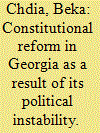

|
|
|
| 13 |
ID:
139284
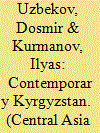

|
|
|
|
|
| Summary/Abstract |
The authors undertake the challenging task of going to the roots of the political instability that enveloped Kyrgyzstan during the period of democratic transit and discover that the bureaucratic state cannot adapt democratic values to the local conditions and, most importantly, does not want to do this. The political elite of Kyrgyzstan, which remains under the spell of Soviet political and spiritual legacy and which has been exhausted by two coups, demonstrates a very low level of cohesion and weakened political will. The authors describe the ways and means that will help the state and society remove the obstacles and remedy the shortcomings to finally acquire political stability and move forward.
|
|
|
|
|
|
|
|
|
|
|
|
|
|
|
|
| 14 |
ID:
116100
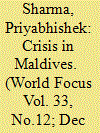

|
|
|
| 15 |
ID:
156085
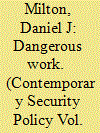

|
|
|
|
|
| Summary/Abstract |
The goal of diplomats is to represent their countries’ interests through diplomacy, not arms. Because they are not military personnel, they may be perceived as at lower risk of being the target of terrorists. However, recent events have called this perception into question. Despite this danger, there has been little research on terrorist attacks against diplomats. Drawing on the terrorism studies literature, this article argues that diplomats are targeted more than non-diplomatic targets in countries where certain U.S. foreign policies are implemented. An empirical analysis of 471 attacks against U.S. diplomats from 1970 to 2011 reveals that while U.S. alliances and foreign aid increase the likelihood of attacks against diplomats, U.S. military intervention and civil war, on the other hand, increase the risk of terrorism against non-diplomatic targets. This finding is relevant because it shows terrorist attacks against diplomats result from certain types of foreign policy.
|
|
|
|
|
|
|
|
|
|
|
|
|
|
|
|
| 16 |
ID:
128861
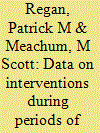

|
|
|
|
|
| Publication |
2014.
|
| Summary/Abstract |
Interventions into civil conflicts have been the focus of considerable research in recent years, but one of the limitations to many studies has been the emphasis on interventions once a conflict begins. While important, we know that states and other actors often take action prior to the onset of a civil war in hopes of diffusing - or exacerbating - a potentially volatile situation. To date, however, no one has been able to study these pre-conflict interventions because appropriate data did not exist. In this article we introduce a new dataset that fits this specific need. Our data identifies states that are at risk of civil war and codes instances of third-party military, economic, and diplomatic interventions. Based on forecasting models that derive risk scores for all states from 1957 to 2007, we are able to identify those states that are most at risk and provide detailed information about interventions that occur in those states. We include a brief empirical example that applies our new data on interventions to test for their effects on the likelihood of civil war or stability. Consistent with prior arguments regarding interventions during civil wars, we show that military interventions increase the risk of civil war onset, while economic and diplomatic interventions forestall that particular outcome. The limited example highlights just one of the potential uses for our new data. With it at hand, researchers will now have the ability to answer many of the vexing problems surrounding the processes that may or may not lead to civil war.
|
|
|
|
|
|
|
|
|
|
|
|
|
|
|
|
| 17 |
ID:
187361
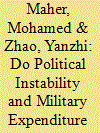

|
|
|
|
|
| Summary/Abstract |
Previous studies have investigated the relationship between political instability and economic growth separately from the relationship between military expenditure and economic growth. Besides, they did not cover the period after 2011 (i.e. the Arab Spring and its consequences). Therefore, this paper attempts to empirically analyze the long-run and short-run impacts of both political instability and military expenditure on economic growth in Egypt. We estimate the autoregressive distributed lag (ARDL) approach using data on the Egyptian economy over the period 1982–2018. For the robustness of our results, we use the fully modified ordinary least squares (FMOLS) estimator. Results of the ARDL approach indicate a significant negative relationship between political instability and economic growth in both the long-run and short-run. Contrarily, military expenditure has an insignificant impact on economic growth, especially in the long-run. These results are confirmed by the FMOLS estimator. Moreover, the estimated coefficient on the one-period lagged error correction term (ECTt-1) indicates that deviations from the long-run equilibrium relationship are corrected within a year.
|
|
|
|
|
|
|
|
|
|
|
|
|
|
|
|
| 18 |
ID:
117020
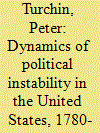

|
|
|
|
|
| Publication |
2012.
|
| Summary/Abstract |
This article describes and analyses a database on the dynamics of sociopolitical instability in the United States between 1780 and 2010. The database was constructed by digitizing data collected by previous researchers, supplemented by systematic searches of electronic media archives. It includes 1,590 political violence events such as riots, lynchings, and terrorism. Incidence of political violence fluctuated dramatically over the 230 years covered by the database, following a complex dynamical pattern. Spectral analysis detected two main oscillatory modes. The first is a very long-term - secular - cycle, taking the form of an instability wave during the second half of the 19th century, bracketed by two peaceful periods (the first quarter of the 19th century and the middle decades of the 20th century, respectively). The second is a 50-year oscillation superimposed on the secular cycle, with peaks around 1870, 1920, and 1970. The pattern of two periodicities superimposed on each other is characteristic of the dynamics of political instability in many historical societies, such as ancient Rome and medieval and early-modern England, France, and Russia. A possible explanation of this pattern, discussed in the article, is offered by the structural-demographic theory, which postulates that labor oversupply leads to falling living standards and elite overproduction, and those, in turn, cause a wave of prolonged and intense sociopolitical instability.
|
|
|
|
|
|
|
|
|
|
|
|
|
|
|
|
| 19 |
ID:
172705
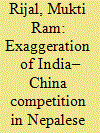

|
|
|
|
|
| Summary/Abstract |
I coded 166 pieces published in the Kantipur and Nagarik daily newspapers from 2008 to 2016 to analyze Nepalese media perception of the growing claims of India–China competition in Nepal. India is perceived as primarily responsible for the political instability in Nepal, and India–China competition is perceived as a secondary, much smaller factor. China itself is not perceived as contributing to political instability in Nepal; it is perceived as indifferent to Nepalese politics. Indian over-engagement, suggestions, and even pressures in Nepal are perceived as interventions in Nepalese politics, while China has successfully cultivated an image of cooperation and of indifference to internal Nepalese affairs.
|
|
|
|
|
|
|
|
|
|
|
|
|
|
|
|
| 20 |
ID:
139030
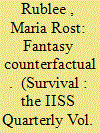

|
|
|
|
|
| Summary/Abstract |
‘If only Ukraine had kept its nuclear weapons, this would never have happened.’ The counterfactual heard around the world after Russia annexed Crimea in March 2014 makes intuitive sense. When the Soviet Union collapsed in 1991, Ukraine became the world’s third-largest nuclear power (behind Russia and the United States), with approximately 1,900 strategic and 2,500 tactical nuclear weapons.
|
|
|
|
|
|
|
|
|
|
|
|
|
|
|
|
|
|
|
|
|